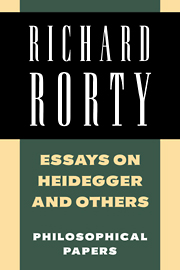Book contents
- Frontmatter
- Contents
- Acknowledgments
- Introduction: Pragmatism and post-Nietzschean philosophy
- Part I
- Part II
- Part III
- Freud and moral reflection
- Habermas and Lyotard on postmodernity
- Unger, Castoriadis, and the romance of a national future
- Moral identity and private autonomy: The case of Foucault
- Index of names
Habermas and Lyotard on postmodernity
Published online by Cambridge University Press: 14 January 2010
- Frontmatter
- Contents
- Acknowledgments
- Introduction: Pragmatism and post-Nietzschean philosophy
- Part I
- Part II
- Part III
- Freud and moral reflection
- Habermas and Lyotard on postmodernity
- Unger, Castoriadis, and the romance of a national future
- Moral identity and private autonomy: The case of Foucault
- Index of names
Summary
In Knowledge and Human Interests Habermas tried to generalize what Marx and Freud had accomplished by grounding their projects of “unmasking” in a more comprehensive theory. The strand in contemporary French thought which Habermas has frequently criticized in recent years starts off from suspicion of Marx and Freud, suspicion of the masters of suspicion, suspicion of “unmasking.” Lyotard, for example, says that he will
use the term “modern” to designate any science that legitimates itself with reference to a metadiscourse of this kind [i.e., “a discourse of legitimation with respect to its own status, a discourse called philosophy”] making an explicit appeal to some grand narrative, such as the dialectics of the Spirit, the hermeneutics of meaning, the emancipation of the rational or working subject, or the creation of wealth.
He goes on to define “postmodern” as “incredulity towards metanarratives,” and to ask “Where, after the metanarratives, can legitimacy reside?” From Lyotard's point of view, Habermas is offering one more metanarrative, a more general and abstract “narrative of emancipation” than the Freudian and Marxian metanarratives.
For Habermas, the problem posed by “incredulity towards metanarratives” is that unmasking only makes sense if we “preserve at least one standard for [the] explanation of the corruption of all reasonable standards.” If we have no such standard, one which escapes a “totalizing self-referential critique,” then distinctions between the naked and the masked, or between theory and ideology, lose their force. If we do not have these distinctions, then we have to give up the Enlightenment notion of “rational criticism of existing institutions,” for “rational” drops out.
- Type
- Chapter
- Information
- Essays on Heidegger and OthersPhilosophical Papers, pp. 164 - 176Publisher: Cambridge University PressPrint publication year: 1991
- 3
- Cited by

